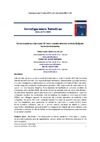Please use this identifier to cite or link to this item:
https://accedacris.ulpgc.es/jspui/handle/10553/72028
| Title: | Cómo reacciona el personal de hotel cuando observa un trato (in)justo hacia los huéspedes | Authors: | Zoghbi Manrique de Lara, Pablo Espino Rodríguez, Tomás Francisco Guerra Báez, Rita María |
UNESCO Clasification: | 531104 Organización de recursos humanos | Keywords: | Recursos humanos Hoteles Reacciones |
Issue Date: | 2014 | Journal: | Investigaciones Turisticas | Abstract: | Este artículo sugiere que el personal de hotel ante un trato (in)justo del hotel hacia los clientes atribuye tal trato a la responsabilidad del hotel y, dependiendo que éste sea justo o injusto, aumentaría o disminuiría sus conductas orientadas al cliente (COBs). Los datos fueron recogidos mediante cuestionarios pasados a 204 empleados de ocho hoteles de lujo en las Islas Canarias (España). Para examinar las hipótesis se utilizaron modelos de ecuaciones estructurales (SEM). No así en el caso de percepciones de justicia distributiva, los resultados muestran que cuanta más justicia procedimental e interpersonal hacia los huéspedes perciban los empleados, más se implican en conductas orientadas al cliente (COBs). Los hallazgos sugieren la necesidad de prevenir episodios de maltrato a los huéspedes por parte del hotel, haciendo especial hincapié en aquellos que son visibles para los empleados, para promover así conductas orientadas al cliente (COBs). Hasta donde nosotros sabemos, este es el primer estudio empírico en donde la justicia organizativa (distributiva, procedimental e interpersonal) dirigida hacia los clientes y las conductas orientadas al cliente (COBs) de los empleados son examinadas conjuntamente en un mismo modelo. This paper suggests that hotel staff perceiving signs of (un)fair treatment to customers by hotels will make responsible of this to the hotel, and depending on whether that treatment is fair or unfair, they increase or decrease their customer-oriented behaviors (COB). Data were collected from 204 surveyed employees at eight luxury hotels in the Canary Islands (Spain). Structural equation modeling (SEM) was used to test the hypotheses. Results demonstrate that the more employees perceive interactional and procedural justice toward guests, the more they engage in customer-oriented behaviors (COBs). These findings suggest the need to prevent events of guest mistreatment by the hotel, especially those visible to employees, in order to promote customer-oriented behaviors (COBs). This is the first empirical study in which both organizational justice (distributive, procedural, and interactional) and citizenship behaviors (OCBs) both directed at customers (COBs) and performed by employees are modeled together. |
URI: | https://accedacris.ulpgc.es/handle/10553/72028 | ISSN: | 2174-5609 | Source: | Investigaciones Turísticas[ISSN 2174-5609] (8), p. 1-22 | URL: | http://dialnet.unirioja.es/servlet/articulo?codigo=4900966 |
| Appears in Collections: | Artículos |
Page view(s)
247
checked on Jan 9, 2026
Download(s)
58
checked on Jan 9, 2026
Google ScholarTM
Check
Share
Export metadata
Items in accedaCRIS are protected by copyright, with all rights reserved, unless otherwise indicated.
